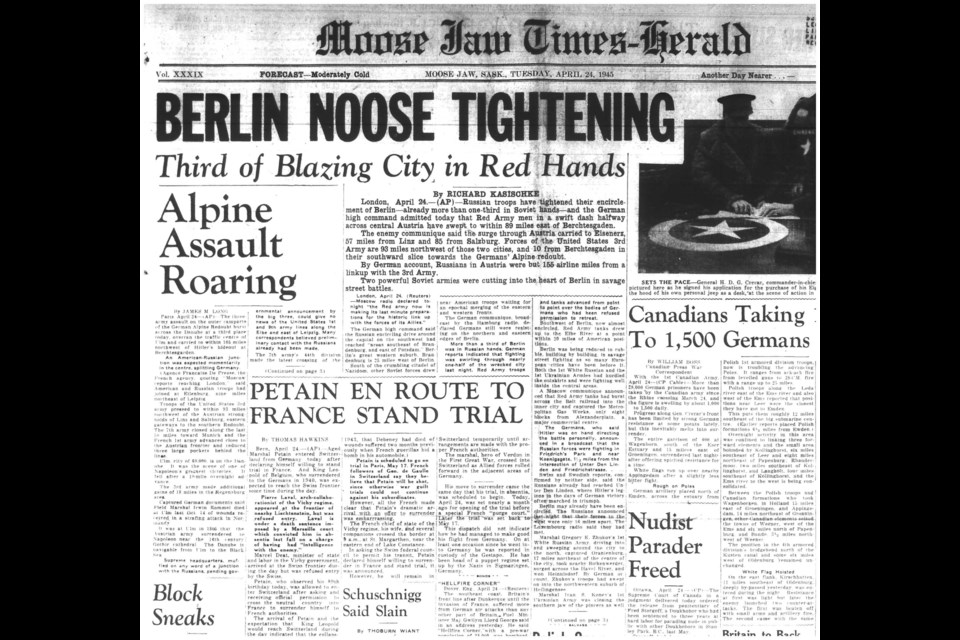MOOSE JAW — After six years of occupation, war and bloodshed in Europe, the front page of the Times-Herald newspaper’s May 8, 1945, edition used only one word to celebrate the war’s end: Victory.
Other headlines in that edition included “Joy … unconfined” and Canadians “react giddily, tearfully, prayerfully” to news of the war’s end.
Eighty years ago, on Victory in Europe (VE) Day, Nazi Germany officially quit the Second World War after the Allied powers — including Canada, the United Kingdom, the United States, the Soviet Union, and other countries — defeated the fascist regime on the water, in the air and on the ground.
“When the records of the Second World War, a conflagration that has swept over the two hemispheres, come to be compiled, it will be found that Moose Jaw’s sons and daughters have played a prominent part in the downfall of the European enemy, and will play a similar definite part in the smashing of Hirohito’s Japan,” an editorial said.
Moose Jaw’s population in 1945 was just over 20,000, with 3,465 men and women “playing their part in defending civilization from being trampled underfoot,” by serving in the army, navy and air force, and in the women’s divisions of those forces, the article continued.
The number of residents who served was just over 17 per cent, so with one out of every six people leaving home “to fight a common foe,” that left a hole in many homes.
Of those “sons and daughters” who enlisted, 1,986 remained on duty in the Dominion, while 1,479 went overseas to fight, with nearly 200 of those men paying “the supreme sacrifice.”
Meanwhile, for more than five years, relatives and friends of those serving suffered anxiety and suspense, but that suspense was over with the conclusion of the European war, the editorial said.
“In the sea, on the land and in the air, Moose Jaw men and women have fought and brought glory to themselves and to their hometown. They have seen the far-off places of the world and carried the battle of the enemy from the Arctic to the Equator,” it continued.
“They have taken part in convoy duty on the broad Atlantic, in northern waters and the Mediterranean. They have sailed landing craft and the multitudinous craft that go to make up the Canadian Navy. Some have (even) served in the Royal Navy.”
Local soldiers fought in Hong Kong, Italy and Western Europe, and during the six years of war, someone could have asked, “Anyone here from Moose Jaw?” and there would have been an affirmative response, the article said.
Men also fought with the Royal Canadian Air Force and Royal Air Force and flew over tropical and Arctic lands and dust-laden deserts and jungles.
Meanwhile, Moose Jaw’s women played “an equally heroic part,” and while their duties mainly occurred in Canada since they filled men’s jobs so the latter could fight, many tended to the wounded and sick on the battlefields of Europe.
The article also highlighted many men who received military honours for their efforts during the war.
Of note, Major David V. Currie received the Victoria Cross — the highest military accolade — for “an act of valour that aroused the admiration of the whole of Canada.” His defensive stand at Falaise, France, in August 1944 prevented many German troops from escaping even though Currie had few soldiers at his disposal. His actions also helped end the three-month-long Battle of Normandy.
Other medals that Moose Jaw men received ranged from the Military Cross to the Distinguished Conduct Medal to Mentioned in Dispatches. One seaman, R.J. Bergin, received the Purple Heart after serving in the United States Navy.
This is part one of four in a series.




